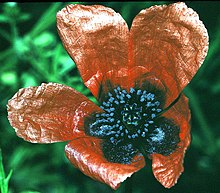List of Papaverales of Montana
Appearance
(Redirected from List of Fumary and Poppy of Montana)

There are at least 13 members of the fumitory and poppy order, Papaverales, found in Montana.[1] Some of these species are exotics (not native to Montana)[2] and some species have been designated as Species of Concern.[3]
Fumary
[edit]Family: Fumariaceae
- Corydalis aurea, golden corydalis
- Corydalis sempervirens, pale corydalis
- Dicentra uniflora, steer's-head
- Fumaria officinalis, drug fumitory
- Fumaria vaillantii, earthsmoke
Poppy
[edit]
Family: Papaveraceae
- Argemone polyanthemos, white prickly-poppy
- Chelidonium majus, celandine
- Glaucium corniculatum, blackspot hornpoppy
- Papaver argemone, pale rough-fruit poppy
- Papaver pygmaeum, alpine glacier poppy
- Papaver radicatum ssp. kluanensis, alpine poppy
- Papaver rhoeas, corn poppy
- Papaver somniferum, opium poppy
Further reading
[edit]- Schiemann, Donald Anthony (2005). Wildflowers of Montana. Missoula, MT: Mountain Press Publishing. ISBN 0-87842-504-7.
See also
[edit]Notes
[edit]- ^ "Fumary and Poppy". Montana Natural Heritage Project. Retrieved 2011-06-17.
- ^ Exotic species have been deliberately or accidentally introduced to areas outside of their native geographic range and are able to reproduce and maintain sustainable populations in these areas. These exotic populations may also be referred to as alien, introduced, invasive, non-native, or non-indigenous. "Species Status Codes, Exotics". Montana Natural Heritage Project. Retrieved 2011-06-17.
- ^ Species of Concern are native taxa that are at-risk due to declining population trends, threats to their habitats, restricted distribution, and/or other factors. Designation as a Montana Species of Concern or Species of Concern is based on the Montana Status Rank, and is not a statutory or regulatory classification. Rather, these designations provide information that helps resource managers make proactive decisions regarding species conservation and data collection priorities. "Species Status Codes, Species of Concern". Montana Natural Heritage Project. Retrieved 2011-06-17.
